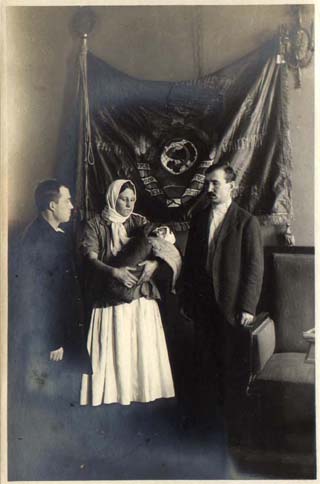Octobering on:
[Wikipedia]
[Google]
[Amazon]
 Octobering was a naming ceremony which occurred during the early era of the
Octobering was a naming ceremony which occurred during the early era of the
p. 92
/ref> Richard Stites, ''Revolutionary Dreams: Utopian Vision and Experimental Life in the Russian Revolution''
p. 111
/ref> The term serves as a translation of two synonymous Soviet"ОКТЯБРИНЫ"
in '' this so-called new Soviet rite contributed to the proliferation of the new names based on revolutionary phraseology, such as Oktyabrina, Vladlen (for
 Octobering was a naming ceremony which occurred during the early era of the
Octobering was a naming ceremony which occurred during the early era of the Soviet Union
The Soviet Union,. officially the Union of Soviet Socialist Republics. (USSR),. was a transcontinental country that spanned much of Eurasia from 1922 to 1991. A flagship communist state, it was nominally a federal union of fifteen national ...
, which involved giving a name to a newborn, introduced by the state on the official basis of Marxist–Leninist atheism as an attempt to replace the religious tradition of christening.Daniel Peris, ''Storming the Heavens: The Soviet League of the Militant Godless''p. 92
/ref> Richard Stites, ''Revolutionary Dreams: Utopian Vision and Experimental Life in the Russian Revolution''
p. 111
/ref> The term serves as a translation of two synonymous Soviet
neologism
A neologism Greek νέο- ''néo''(="new") and λόγος /''lógos'' meaning "speech, utterance"] is a relatively recent or isolated term, word, or phrase that may be in the process of entering common use, but that has not been fully accepted int ...
s: ''Oktyabryenie'', coined in an analogy to ''Kreshcheniye'', literally, the sacrament
A sacrament is a Christianity, Christian Rite (Christianity), rite that is recognized as being particularly important and significant. There are various views on the existence and meaning of such rites. Many Christians consider the sacraments ...
of "baptism
Baptism (from grc-x-koine, βάπτισμα, váptisma) is a form of ritual purification—a characteristic of many religions throughout time and geography. In Christianity, it is a Christian sacrament of initiation and adoption, almost inv ...
", and ''Oktyabriny'' instead of ', the latter being a family celebration on the occasion of baptism.
The term ''Oktyabriny'' is distinct from ''Oktyabrina'', which is a Soviet given name. All three words are derived from the word ''Oktyabr'', (October), commemorating the October Revolution
The October Revolution,. officially known as the Great October Socialist Revolution. in the Soviet Union, also known as the Bolshevik Revolution, was a revolution in Russia led by the Bolshevik Party of Vladimir Lenin that was a key moment ...
.
Since the religious symbol of the Christian cross was replaced with the revolutionary symbol of Red Star
A red star, five-pointed and filled, is a symbol that has often historically been associated with communist ideology, particularly in combination with the hammer and sickle, but is also used as a purely socialist symbol in the 21st century. I ...
(Russian: "krasnaya zvezda"), the ceremony was also called ''zvezdiny'', in an analogy with ''krestiny'', the term "to Christen" (Russian: ''okrestit'') was replaced with the term ''ozvezdit''.
Despite being short-lived,in ''
Ushakov Dictionary
The ''Explanatory Dictionary of the Russian Language'', also called just ''Ushakov's Dictionary'', is one of the major dictionaries of the Russian language.
Edited by the philologist and lexicographer Dmitry Ushakov
Dmitry Nikolayevich Ushakov ...
''Vladimir Lenin
Vladimir Ilyich Ulyanov. ( 1870 – 21 January 1924), better known as Vladimir Lenin,. was a Russian revolutionary, politician, and political theorist. He served as the first and founding head of government of Soviet Russia from 1917 to 19 ...
), etc.
Cultural references
In the 1988 film ''Heart of a Dog
''Heart of a Dog'' (russian: links=no, italic=yes, Собачье сердце, Sobachye serdtse) is a novella by Russian author Mikhail Bulgakov. A biting satire of Bolshevism, it was written in 1925 at the height of the NEP period, when commu ...
'' there is an episode where a mother who brought a newborn baby girl to ''ozvezdit'' was given a choice of "revolutionary names": Barrikada, Bebelina, ...
References
{{reflist Naming ceremonies Culture of the Soviet Union